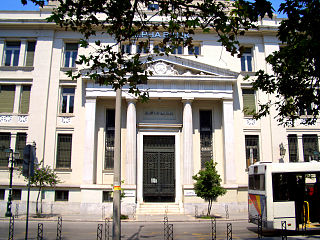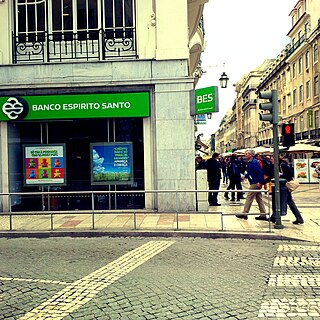The Inter-Alpha Group of Banks was created in 1971 by six banks in the European Community to provide a platform for the regular exchange of ideas and to explore areas for cooperation between its member banks. The group is a non-hierarchical association and is maintained by mutual agreement with each bank retaining full autonomy and independence.
It was one of the banking clubs set up during the 1960s and 1970s when a number of European banks attempted to cooperate at an international level. [1]
The group's function has evolved to:
Membership of the group has grown to eleven banks, representing 15 European countries:

The Bank for International Settlements (BIS) is an international financial institution which is owned by member central banks. Its primary goal is to foster international monetary and financial cooperation while serving as a bank for central banks. With its establishment in 1930 it is the oldest international financial institution. Its initial purpose was to oversee the settlement of World War I war reparations.

The National Bank of Greece is a banking and financial services company with its headquarters in Athens, Greece. Founded in 1841 as the newly independent country's first financial institution, it has long been the largest Greek bank, a position it still held in the early 21st century. Following the financial turmoil of the Greek government-debt crisis in the 2010s, it remains one of Greece's four dominant banks together with Alpha Bank, Eurobank Ergasias, and Piraeus Bank. It has been designated as a Significant Institution since the entry into force of European Banking Supervision in 2014, and as a consequence is directly supervised by the European Central Bank. NBG offers financial products and services for corporate and institutional clients along with private and business customers. Services include banking services, brokerage, insurance, asset management, shipping finance, leasing and factoring markets.

Alpha Bank is a private Greek bank. Its founder was John Kostopoulos Alpha Bank's Network in Greece has 273 branches and 783 ATMs.

Banco de Sabadell, S.A. is a Spanish multinational financial services company headquartered in Alicante and Barcelona, Spain. It is the 4th-largest Spanish banking group. It includes several banks, brands, subsidiaries and associated banks. It is a universal bank and specialises in serving small and medium enterprises (SMEs) and the affluent with a bias towards international trade.

Banco Santander S.A. trading as Santander Group, is a Spanish multinational financial services company based in Santander, with operative offices in Madrid. Additionally, Santander maintains a presence in most global financial centres as the 19th-largest banking institution in the world. Although known for its European banking operations, it has extended operations across North and South America, and more recently in continental Asia. It is considered a systemically important bank by the Financial Stability Board.

Private banking is a general description for banking, investment and other financial services provided by banks and financial institutions primarily serving high-net-worth individuals (HNWIs) – those with very high income or substantial assets. Private banking is presented by those who provide such services as an exclusive subset of wealth management services, provided to particularly affluent clients. The term "private" refers to customer service rendered on a more personal basis than in mass-market retail banking, usually provided via dedicated bank advisers. It has typically consisted of banking services, discretionary asset management, brokerage, limited tax advisory services and some basic concierge services, typically offered through a gateway provided by a single designated relationship manager.

Caixa Geral de Depósitos (CGD) is a Portuguese state-owned banking corporation, and the largest bank in Portugal, established in Lisbon in 1876.

Banco Espírito Santo was a Portuguese bank based in Lisbon that on 3 August 2014 was split in two banks: Novo Banco, which kept its healthy operations, and a "bad bank" to keep its toxic assets.

Banco Comercial Português is a Portuguese bank that was founded in 1985 and is the largest private bank in the country. BCP is a member of the Euronext 100 stock index and its current chief executive officer is Miguel Maya Dias Pinheiro. BCP is based in Porto, but its operations are headquartered in Oeiras, Greater Lisbon. It operates a branch brand-dubbed and restyled in 2004 as Millennium BCP as well as Banque BCP and ActivoBank.

Bancolombia S.A. is a full-service financial institution that provides financial products and services in Colombia, Panama, El Salvador, Puerto Rico, the Cayman Islands, Peru and Guatemala. Bancolombia is one of the six banking-related companies of the COLCAP index. The Bank operates in nine segments: Banking Colombia, Banking El Salvador, Leasing, Trust, Investment, Brokerage, Off Shore, Pension and Insurance, and all other segments.

Intesa Sanpaolo S.p.A. is an Italian international banking group. It is Italy's largest bank by total assets and the world's 27th largest. It was formed through the merger of Banca Intesa and Sanpaolo IMI in 2007, but has a corporate identity stretching back to its first foundation as Istituto Bancario San Paolo di Torino in 1583.
Open Ukraine Foundation is a nonpartisan international philanthropic foundation established in July 2007 by Arseniy Yatsenyuk and Zbigniev Drzymala to support public diplomacy and raise the profile of Ukraine internationally. Also for strengthening and development of Ukraine's reputation in the world.

Banco Palmas is a Brazilian community bank founded in 1998 in Conjunto Palmeiras, a neighborhood of 32,000 inhabitants located in the suburbs of Fortaleza - Ceará, Brazil operating under the principle of the "Solidarity Socio-Economy."
Sareb is the bad bank of the Spanish government. Its purpose is to manage and disinvest high-risk assets that were transferred to it from the four nationalized Spanish financial institutions. The company was formed in 2012.
Union of Arab Banks (UAB) is an organization responsible for fostering cooperation between Arab banks, developing of Arab financial business, and enhancing the financing role of Arab banks in the Arab World. The Union of Arab Banks was formed on March 13, 1974, during a meeting of an elite group of Arab banks and management leaders under the umbrella of the Arab Administrative Development Organization. The meeting reached a conclusion to establish an Arab organization working within the framework of the unions emanated from the Arab League..

Creand is a financial group in the Principality of Andorra founded in 1950. The group has a presence in Andorra, Spain, Luxembourg, the United States (Miami) and Panama.

Banco de Crédito de Bolivia is a banking and financial services company located in Bolivia. It is headquartered in La Paz and is a wholly owned international subsidiary of Banco de Crédito del Perú, Peru's largest bank. BCP Bolivia started its operations in the country following BCP's acquisition of the Bolivian bank Banco Popular. BCP Bolivia provides its products and services through operating 102 branches, 240 ATMs, call centers, and online and mobile banking platforms. Banco de Crédito de Bolivia is currently Bolivia's fourth largest bank by total assets.

Banco Bilbao Vizcaya Argentaria, S.A., better known by its initialism BBVA, is a Spanish multinational financial services company based in Bilbao, with operative offices in Madrid. It is one of the largest financial institutions in the world, and is present mainly in Spain, Portugal, Mexico, South America, Turkey, Italy and Romania.

Banco Nacional de BoliviaS.A. (BNB) (English: National Bank of Bolivia) is a Bolivian bank and financial institution headquartered in Sucre, Bolivia. Founded in 1871, it is one of Bolivia's oldest banks. It is also the country's second largest bank by total assets.

Unico Banking Group was a partnership of eight European co-operative banks founded in 1977 and effectively wound down in 2017.